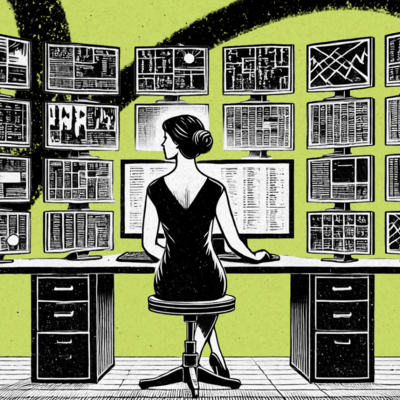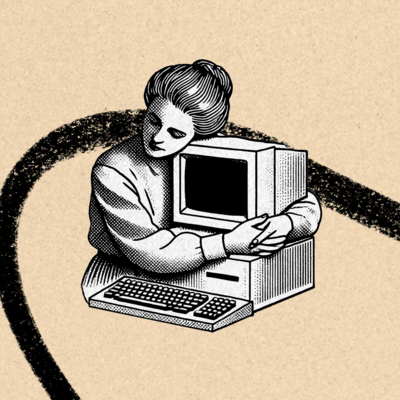
The Future of Work Is About Doing Better—Not Less
AI won’t eliminate human effort. It’ll redirect it.
Was this newsletter forwarded to you? Sign up to get it in your inbox.
Along with the future of artificial intelligence, I write about mid-century American bank robbers.
I write scripts for a history podcast, and one would think that it’s the perfect task to outsource to LLMs. I’ve written many of these before, know exactly what’s expected, and am fairly confident I can articulate them in a prompt. I also have existing research so I can give the LLM reliable knowledge to draw from.
But when my partner asked me if I’m going to use AI to write them, my instinctive answer was: “No, I want to do a good job.”
After some introspection, I realized that my reaction had nothing to do with AI’s capabilities. I was holding on to a quiet assumption: If AI makes writing easier, something important must be getting lost along the way. Reduced effort must mean reduced quality. Because of this irrational thought, I don’t use AI as much as I can—even though it would free me to focus on the aspects of writing I like more.
This relationship between effort and perceived value isn’t novel. It’s a human tendency that surfaces in surprising contexts: The American cake mix industry, of all things, grappled with a similar situation decades ago. When cake mix sales fell because their powdered product alienated consumers from the baking process, the industry found an elegant solution: Don’t reduce effort—redirect it.
As I dug into the psychology behind our relationship with effort, I saw a parallel in our attitudes to using AI for work. I believe the horizon of effort—the energy and attention we invest in our work—isn’t reducing, it’s shifting. This essay explores how I think we can thoughtfully redefine where we entrust our effort.
EOY Every discount
Make 2025 more productive
You’re not ready for 2025 if you haven’t figured out your AI strategy. Let us help you. We’re offering 33% off Every. This includes analyses from some of the best tech writers on the internet, courses like How to Write With AI, and a suite of AI tools—Spiral to automate repeat writing tasks, Lex to help you write better, and Sparkle to clean up your desktop. Join us and get a head start on 2025.
A quick primer on the cake mix industry
General Mills, the owner of the popular Betty Crocker brand, was one of the first companies to promise Americans a reliable, no-fuss way to bake a cake. Add water to the instant cake mix, give it a stir, pop it in the oven…and 30 minutes later you’d have a cake. A freshly baked one, at that. You’d have all the rewards of a homemade cake—admiring comments from guests, and a warm, sweet aroma in your kitchen—but none of the mess.
After literally selling like hot cakes for half a decade, in the mid-1950s, America’s cake mix industry saw a slump in demand. General Mills was at a loss. The company hired consumer psychologist Ernest Dichter to find out why the mix had stopped selling. Dichter interviewed the target customer—American housewives—to conclude that they felt bad about using instant cake mix. He wrote, “This is typical of what the average housewife said: ‘Yes, I’m using a cake mix; it saves me a lot of trouble but I really shouldn’t.’”
Dichter’s advice was to give these women a bigger role in the cake-making process. For them to enjoy the fruits of a homemade cake, they needed to do more than just stir and add water.
General Mills took his words to heart—its cake mixes now demanded water, a good stir, and a fresh egg. The story goes that cracking an egg into the powdered mix changed everything. The boxes of deconstructed baked goodness started flying off the shelves, and all was well in cake mix land again.
Many on the internet have challenged the specifics of this story. They argue that adding a fresh egg wasn’t just a marketing tactic, it actually made the cakes taste better (dried egg powder— which is what General Mills used previously—apparently tastes as bad as it sounds). The cake mix aficionados mostly agree that sales picked up because of another marketing tactic: redefining what making a homemade cake meant. General Mills downplayed the actual baking of the cake, putting more emphasis on how the cake looked. Cake decoration became the part of the process where bakers—armed with frosting sugar and sprinkles—could express themselves. Take this 1974 cake recipe. It has 18 steps—by step five, the cake mix is baked and ready, and the other 13 steps are about making it look pretty, using skewers, straws, and even a paint brush.
Whether fresh eggs or frosting sugar saved the cake mix industry is up for debate, but what this story tells us about human nature is the same: Our relationship with effort is more complicated than we think. We assume that given a choice to do the same thing in two ways, we would choose the one which requires less effort. But that isn’t always true. Sometimes, we want to break the egg and decorate the cake ourselves, a phenomenon pop psychology calls the “Betty Crocker Effect.”
Why less isn’t always more
The assumption that humans make choices that need the least amount of effort has extended into the way we do business. Think of the option of paying a few dollars more to have a package delivered to your doorstep, saving you the walk to a nearby pick-up point. As a general principle, a product or service that requires consumers to expend less effort is valued more highly than one that demands more effort. This is baked into the way most AI consumer apps are marketed: with the promise that LLMs will help you achieve more while doing less.
The Betty Crocker Effect pokes a gaping hole in this theory. Consumers may not want products or services (like cake mix) to abstract away all the effort from the desired end result (a homemade cake). The Betty Crocker Effect is explained by psychological concepts like:
- Effort justification: We tend to value outcomes more highly when they are obtained through our own effort because we’re trying to justify the effort that we’ve put in.
- Learned industriousness: If high effort is paired with high reward enough times, we start associating effort with reward, leading us to internalize the value of effort and become more willing to exert it.
- Flow: Being immersed in a cognitively demanding task can produce positive feelings of focus and enjoyment.
As someone looking for ways to develop a better relationship with AI, examining my relationship with effort prompted me to ask myself a couple of questions:
Can I objectively judge the quality of my own work?
When I perceive something to be good because I’ve put effort into it, this perception isn’t always based in objective reality. It’s subjective, fed by deep-rooted psychological tendencies. On the other hand, when it comes to the work I do professionally, I try my best to hold my writing to an objective standard of quality.
I optimize for thought-provoking, clear, fun writing. As I integrate AI into my writing workflow, I want to develop the ability to evaluate my work based on merit, unencumbered by how much effort I put into it. If my writing meets the objective standards I’ve set for myself, I want to be mindful of not dismissing it just because AI made the process more efficient.
Can I find other ways to differentiate myself?
LLMs have made the act of filling a page—or even hundreds of pages—with words accessible to anyone with a computer and a ChatGPT subscription. I’m a writer and I take pride in the work I do, so when just about anyone could, in theory, write, I admit to having moments where I felt like I was robbed of something special.
I’m beginning to reframe this narrative for myself. If the cake mix sleuths are right about Betty Crocker sales going up because of an emphasis on cake decorating, I need to find my equivalent of cake decorating. When a skill becomes generally accessible—like baking cakes from scratch in the 1950s, or writing today—it pushes us to find new ways to make it distinctly our own—like cake decorating, or writing with personality.
The horizon of effort is rising
When technology makes it easier to do knowledge work, it doesn’t mean our contribution—the effort we put into our work—disappears. The direction of our effort simply shifts. It moves toward the aspects of our work that are more creative, that require strategic thinking, and of course, that we derive meaning from.
What that means for me, as I spend the next week writing scripts for a history podcast, is choosing a bank heist that I think will be interesting to a wide audience (strategic thinking), getting into the mind of the bank robber and writing the cold open of the the podcast in first person (creativity), and finding just the right metaphors (something I enjoy doing).
AI isn’t going to eliminate human effort. It’ll elevate our potential—by allowing us to focus on tasks that we find most rewarding and where our contribution is uniquely valued. The horizon of effort isn’t just shifting—it’s rising.
Rhea Purohit is a contributing writer for Every focused on research-driven storytelling in tech. You can follow her on X at @RheaPurohit1 and on LinkedIn, and Every on X at @every and on LinkedIn.
We also build AI tools for readers like you. Automate repeat writing with Spiral. Organize files automatically with Sparkle. Write something great with Lex.
Get paid for sharing Every with your friends. Join our referral program.
Find Out What
Comes Next in Tech.
Start your free trial.
New ideas to help you build the future—in your inbox, every day. Trusted by over 75,000 readers.
SubscribeAlready have an account? Sign in
What's included?
-
Unlimited access to our daily essays by Dan Shipper, Evan Armstrong, and a roster of the best tech writers on the internet
-
Full access to an archive of hundreds of in-depth articles
-
-
Priority access and subscriber-only discounts to courses, events, and more
-
Ad-free experience
-
Access to our Discord community



Comments
Don't have an account? Sign up!
Rhea, your last paragraph truly struck a chord with me: 'AI isn't going to eliminate human effort. It will elevate our potential by allowing us to focus on tasks that we find most rewarding and where our contribution is uniquely valued. The horizon of effort isn't just shifting. It's rising.' I couldn’t agree more, and this has been my lived experience over the past six months.
AI has completely transformed how I work and think—not by reducing my effort but by redirecting it to what I love most and do best. It’s allowed me to focus on deep thinking, strategy, and creativity in ways I couldn’t have imagined before. I’ve seen this shift not just in my own life but also in the lives of friends who have embraced AI as a tool for growth and alignment.
This is the story I want to help others understand: AI isn’t about doing less—it’s about doing better. Thank you for articulating this so beautifully. Your insights have added depth and clarity to a perspective I’m deeply passionate about sharing
@kfelten thanks so much for the note katie!!
Just loved the history about the cake industry ((:
@felipegsebastiao thank you!!
It’s no surprise you enjoy “finding the right metaphors.” You absolutely nailed it with the Betty Crocker Effect reference!
@itsbowden thanks so much!! appreciate you for reading